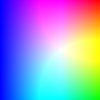There's no sensible reason. "HLSL(tm)" itself might be owned by Microsoft (hence why nVidia Cg(tm) isn't called HLSL), but Khronos can clone the syntax and use a different name.
Off on a tangent -- HLSL/Cg were developed simultaneously / in cooperation between Microsoft and nVidia, so they were originally the same language, with HLSL(tm)/Cg(tm) being names for the two company's different implementations of this shared language. It's public knowledge that Xbox360/XboxOne use HLSL, that PS3 uses Cg and that PS4 uses "PSSL", which they basically descibe as a blatant HLSL clone. That's all 4 major consoles basically using the same shader language, even though they use 4 extremely different graphics APIs.
HLSL is the C of GPU programming. Every API except for GL uses a HLSL derivative (something close enough to HLSL that it may as well be HLSL) -- every modern console/PC game engine I've worked on has written their shaders in HLSL, with a small "portability header" containing some #define's to mask the API/platform differences involved in supporting 8 APIs... Then for the Mac/Linux ports (the 9th API: OpenGL), we have to use a dodgy HLSL<->GLSL translator.
If Khronos are smart, they'll define a portable shader bytecode format, and then allow the creation of HLSL and GLSL front-end compilers, which turn our source code into this portable bytecode. Then they can keep all their GLSL work and satisfy backwards compatibility for old GL users, while allowing them to move into the modern world
Ta, I'd suspected this was the case but my (admittedly rushed and half-baked) research didn't turn up anything.
On a slightly related tangent, and I'm not sure if this has percolated into the general awareness yet, but Windows 7 came out of mainstream support on Wednesday of last week (13th January). What this means is security updates and bugfixes will continue, but no more new functionality. In turn, this is probably the clearest confirmation we have so far that D3D 12 will not be coming to Windows 7, and so it looks as though Microsoft are going to consciously and deliberately do the wrong thing for marketing reasons rather than for technical reasons. So it's kinda even more important that the ARB make some sensible choices and don't screw up again this time.











